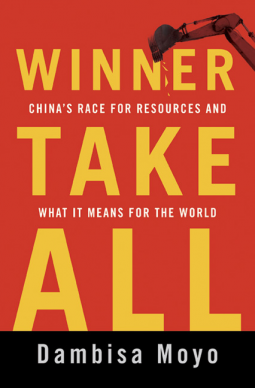
Winner Take All
China's Race for Resources and What It Means for the World
by Dambisa Moyo
This title was previously available on NetGalley and is now archived.
Send NetGalley books directly to your Kindle or Kindle app
1
To read on a Kindle or Kindle app, please add kindle@netgalley.com as an approved email address to receive files in your Amazon account. Click here for step-by-step instructions.
2
Also find your Kindle email address within your Amazon account, and enter it here.
Pub Date Jun 05 2012 | Archive Date Sep 01 2012
Perseus Books Group | Basic Books
Description
Winner Take All is about the commodity dynamics that the world will face over the next several decades. In particular, it is about the implications of China's rush for resources across all regions of the world. The scale of China's resource campaign for hard commodities (metals and minerals) and soft commodities (timber and food) is among the largest in history. To be sure, China is not the first country to launch a global crusade to secure resources. From Britain's transcontinental operations dating back to the end of the 16th century, to the rise of modern European and American transnational corporations between the mid 1860's and 1870's, the industrial revolution that powered these economies created a voracious demand for raw materials and created the need to go far beyond their native countries.
So too is China's resource rush today. Although still in its early stages, already the breadth of China's operation is awesome, and seemingly unstoppable. China's global charge for commodities is a story of China's quest to secure its claims on resource assets, and to guarantee the flow of inputs needed to continue to drive economic development. Moyo, an expert in global commodities markets, explains the implications of China's resource grab in a world of diminishing resources.
An international economist and one of the world's leading experts on macroeconomics and global affairs, in 2009 Moyo was named by Time as one of the "100 Most Influential People in the World," and was nominated to the World Economic Forum's Young Global Leaders Forum. Her writing regularly appears in economic and finance-related publications such as the Financial Times, the Economist, and the Wall Street Journal. In September 2009 Moyo was featured on Oprah Winfrey's "Power List" of twenty remarkable visionaries. She has appeared as a guest CNN, CNBC, BBC, and Fox Business.
Moyo serves on the board of Barclays Bank, SABMiller and Lundin Petroleum. She has done numerous speaking engagements at organizations including OECD, World Bank, IMF, Council on Foreign Relations, and the American Enterprise Institute. In 2009 she spoke at the TEDx conference at the EU Parliament.
She holds a PhD in economics from Oxford and an MPA from Harvard. She lives in London.
Available Editions
| EDITION | Hardcover |
| ISBN | 9780465028283 |
| PRICE | $25.00 (USD) |
| PAGES | 240 |



